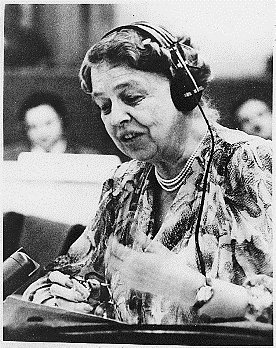I have this friend, Amanda. She’s smart, funny, young and passionate about a great many things, but… at the top of the list would have to be human rights.

Amanda is so fervent about the rights of others that she started her own non-profit devoted to creating an awareness of, connection to and action for a variety of human rights issues. It’s not surprising that the name of her organization is A.C.A. – Awareness, Connection, Action. And Amanda exemplifies all of that!
If she were around in 1948, I’m certain that she’d be on Eleanor Roosevelt’s staff in some capacity – certainly notserving coffee.
Probably the most accomplished First Lady of any generation, Eleanor Roosevelt was appointed the United States Delegate to the United Nations General Assembly (Yes, that General Assembly, the one with the Big room) from 1946 to 1952. During her tenure, Roosevelt chaired the committee that drafted and approved the Universal Declaration of Human Rights. On September 1948, in an inspiring address to a Parisian audience, Roosevelt called the Declaration “the international Magna Carta of all mankind.”
What follows are excerpts from that extraordinary speech.
“I have come this evening to talk with you on one of the greatest issues of our time — that is the preservation of human freedom. I have chosen to discuss it here in France… because here in this soil the roots of human freedom have long ago struck deep and here they have been richly nourished. It was here the Declaration of the Rights of Man was proclaimed, and the great slogans of the French Revolution — liberty, equality, fraternity — fired the imagination of men…
“In the preamble to the Charter the keynote is set when it declares: ‘We the people of the United Nations determined.. .to reaffirm faith in fundamental human rights, in the dignity and worth of the human person, in the equal rights of men and women and of nations large and small, and… to promote social progress and better standards of life in larger freedom.’ This reflects the basic premise of the Charter that the peace and security of mankind are dependent on mutual respect for the rights and freedoms of all…
“It was decided in our Commission that a Bill of Rights should contain two parts:
“1. A Declaration which could be approved through action of the Member States of the United Nations in the General Assembly. This declaration would have great moral force, and would say to the peoples of the world ‘this is what we hope human rights may mean to all people in the years to come.’ We have put down here the rights that we consider basic for individual human beings the world over to have. Without them, we feel that the full development of individual personality is impossible.
“2. The second part of the bill… is a covenant which would be in the form of a treaty to be presented to the nations of the world. Each nation, as it is prepared to do so, would ratify this covenant and the covenant would then become binding on the nations which adhere to it. Each nation ratifying would then be obligated to change its laws wherever they did not conform to the points contained in the covenant…
“Basic human rights are simple and easily understood: freedom of speech and a free press; freedom of religion and worship; freedom of assembly and the right of petition; the right of men to be secure in their homes and free from unreasonable search and seizure and from arbitrary arrest and punishment.
“We must not be deluded by the efforts of the forces of reaction to prostitute the great words of our free tradition and thereby to confuse the struggle. Democracy, freedom, human rights have come to have a definite meaning to the people of the world which we must not allow any nation to so change that they are made synonymous with suppression and dictatorship…
“We, in the democracies, believe in a kind of international respect and action which is reciprocal. We do not think others should treat us differently from the way they wish to be treated… Naturally there must always be consideration of the rights of others; but in a democracy this is not a restriction. Indeed, in our democracies we make our freedoms secure because each of us is expected to respect the rights of others and we are free to make our own laws…
“Sometimes the processes of democracy are slow… This we have learned by experience and we accept the slow processes… because we know that shortcuts compromise principles on which no compromise is possible…
“…The struggle is bound to be difficult and one in which we must be firm but patient. If we adhere faithfully to our principles I think it is possible for us to maintain freedom and to do so peacefully…
“The place to discuss the issue of human rights is in the forum of the United Nations. The United Nations has been set up as the common meeting ground for nations, where we can consider together our mutual problems and take advantage of our differences in experience. It is inherent in our firm attachment to democracy and freedom that we stand always ready to use the fundamental democratic procedures of honest discussion and negotiation. It is now as always our hope that despite the wide differences in approach we face in the world today, we can with mutual good faith in the principles of the United Nations Charter, arrive at a common basis of understanding.
“…As one of the Delegates from the United States, I pray Almighty God that we may win another victory here for the rights and freedoms of all men.”
If we’re ever to achieve our best, we need to adopt Roosevelt’s “common basis of understanding,” and we need more Eleanor Roosevelts and Amandas to get the job done!
Comments









